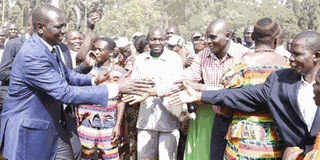It is make or break for Ruto as he seeks to stop ICC case

Deputy President William Ruto greets delegates after a meeting with political and opinion leaders from Kakamega and Bungoma counties at his Sugoi home in Eldoret on January 8, 2016. PHOTO | CHARLES KIMANI |
What you need to know:
- Mr Ruto is tentatively set to depart for The Hague on Monday night accompanied by a big-powered team of Cabinet Secretaries, MPs, senators and governors to listen to his application seeking the dismissal of the charges he faces alongside former radio personality Joshua Arap Sang.
- The hearings will start next Tuesday and run until Friday.
- Mr Ruto and his co-accused Mr Sang will be required to attend the court in person during the four days the judges will hear their application of a no-case-to-answer motion.
- The judges will also listen to oral submissions from the prosecution and lawyers for the victims.
Deputy President William Ruto heads to the International Criminal Court next week in what could be his last chance to stop the case that could make or break his political career.
Mr Ruto is tentatively set to depart for The Hague on Monday night accompanied by a big-powered team of Cabinet Secretaries, MPs, senators and governors to listen to his application seeking the dismissal of the charges he faces alongside former radio personality Joshua Arap Sang.
The hearings will start next Tuesday and run until Friday.
On Friday, Mr Ruto’s spokesman Emmanuel Tallam and National Assembly Majority leader Aden Duale separately confirmed that the Deputy President would travel to The Hague on Monday.
“I am leading over 50 MPs, governors and even Cabinet Secretaries to show solidarity with the Deputy President.
The first batch is leaving on Monday night with the DP and the second will follow on Tuesday or Wednesday,” Mr Duale said.
“It will be a great opportunity for the defence team to use the four days to prove to the ICC judges that Mr Ruto has no case to answer and that it is all politically motivated,” he added.
NO-CASE-TO-ANSWER MOTION
Mr Ruto and his co-accused Mr Sang will be required to attend the court in person during the four days the judges will hear their application of a no-case-to-answer motion.
The judges will also listen to oral submissions from the prosecution and lawyers for the victims.
The no-case-to-answer application was initially set for November 24 and 25 last year but was pushed to Tuesday next week after Mr Ruto persuaded the court to excuse him so he could be in the country during Pope Francis’ visit.
Mr Ruto and Mr Sang want the judges to throw out the cases facing them on the grounds that the ICC Prosecutor Fatou Bensouda has failed to prove that they have a case to answer in the first place.
Mr Ruto and Mr Sang’s lawyers will be required to file convincing arguments against each of the three charges their clients face including murder, forcible transfer of populations and persecution during the hearings.
The success of this application would automatically end the case that threatens to derail Mr Ruto’s political career.
Should the defence teams fail to convince the judges to end the case, it would complicate the Deputy President’s political career since he would have to devote a lot of time and resources defending himself.
It is at that stage that the defence would present their evidence including calling witnesses to testify.
HOSTED DELEGATIONS
Mr Ruto has spent the better part of the last two months hosting delegations of leaders from regions perceived to support the opposition in a bid to mobilise support for the Jubilee administration.
During these meetings at his Sugoi home on the outskirts of Eldoret town, Mr Ruto has shown little apprehension regarding the enormity of the matter he faces next week, enthusiastically preaching the need for Kenyans to unite under the new Jubilee party.
On Thursday, Mr Ruto hosted a delegation from Kisii and Nyamira counties, perceived to be strongholds of the Coalition for Reform and Democracy (Cord).
On Friday, Mr Ruto yet again hosted a delegation from Kakamega County, a region perceived to be a stronghold of Amani National Congress leader Musalia Mudavadi.
Two weeks earlier, Mr Ruto hosted delegations from Bungoma and Trans Nzoia counties.
FRESH APPLICATION
Ms Bensouda appeared to dampen the spirits of Mr Ruto’s supporters on Monday when she filed a fresh application to the ICC judges, opposing the inclusion of a statement on recanted testimony by the Assembly of State Parties.
“The prosecutor submits ASP statement is irrelevant and should not be added to the appeals records,” the prosecutor said.
She was responding to an application by Mr Sang that the ASP statement be included in their appeal against the court’s decision allowing the prosecutor to use recanted evidence in the cases facing them.
Mr Ruto and Mr Sang had received a major boost in their fight to end the case when the ASP during its meeting late last year reaffirmed that recanted evidence could not be used retroactively.
“If, however, the Appeals Chamber is of the view the relevance of the ASP statement requires further analysis, the prosecution requests the chamber to order the Sang defence to substantiate the procedural and legal basis for its addition to the record and permit the parties and participants to respond,” Ms Bensouda argued.
In its final report, the ASP said: “The Assembly recalled its resolution, dated 27 November 2013, which amended rule 68 of the Rules of Procedure and Evidence, which, consistent with the Rome Statute, reaffirmed its understanding that the amended rule 68 shall not be applied retroactively.





